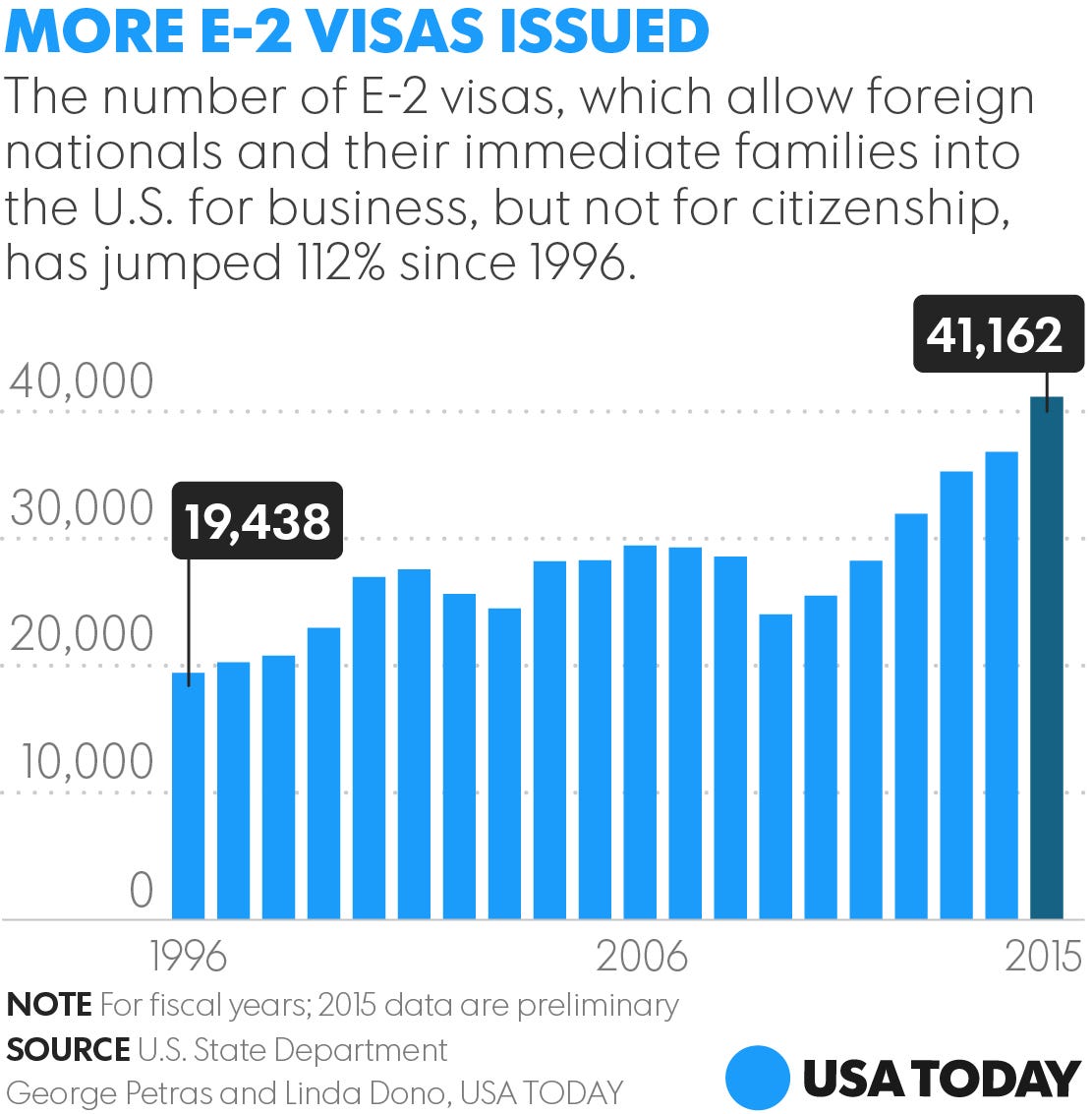Visa lets migrants start U.S. firms but not be citizens

A little-known but increasingly popular visa program lets foreign nationals open and invest in businesses, pay taxes, hire American workers and send their children to public schools — but does not let them become permanent residents.
This past year, state and federal lawmakers tried to reform the program, but like the rest of the country’s immigration system, the proposed legislation failed to gain traction.
“I’ve seen some E-2 owners have families in the U.S. and they have a U.S. citizen child who turns 21. And the child can petition (to have their parents become residents), but that takes over 20 years,” said Brent Renison, an immigration lawyer for the Portland, Ore., firm Parrilli Renison.
Trump rejects moderation, goes hard-line on immigration
The E-2 visa, also known as the nonimmigrant investor visa, allows people from certain countries to invest in businesses in the United States. Those businesses could range from restaurants and flower shops to multi-national corporations.
In the past five years, the number of E-2 visas that the U.S. State Department issued has grown by 46% from 28,000 to 41,000, according to federal government data. In the past 20 years, the number has more than doubled, dipping slightly after Sept. 11, 2001, and the Great Recession.
Among this year’s stalled reform efforts was a bill that Rep. David Jolly, R-Fla., introduced to allow E-2 visa holders to become permanent residents after being in the country 10 years. The bill, introduced in April and referred to the subcommittee on immigration and Border Security in May, hasn’t gone anywhere since and would have to be reintroduced in the next congressional session.
The E-2 visa doesn’t have a path to residency built into it. Business owners who earn enough money can become permanent residents through another program, the EB-5 investor visa, that involves applicants paying $1 million — $500,000 if they invest in a rural area or one with high unemployment.
Children of E-2 visa holders also do not have a path to residency through the visa. Their option is to get a student visa to go to college and find an employer willing to sponsor them after they graduate.
California state Assemblyman Chad Mayes, a Republican who lives in Yucca Valley, Calif., introduced legislation to make this a little easier on E-2 holders’ wallets by granting in-state tuition to community colleges and public universities to their children.
Children of E-2 holders now lose dependency status and in-state tuition benefits at 21. The proposed bill would allow students to keep in-state tuition, a benefit available to undocumented immigrants.
"Students who entered California legally, many of whom know no other home, deserve an equal opportunity to obtain a college education to achieve their dreams," Mayes said in a written statement. "They should qualify for and be allowed to pay in-state tuition to give them that chance."
More educated Asians are coming to America
Mayes introduced the bill in February after a constituent brought up concerns about current policy. The bill passed the Higher Education committee in April and has been held in the Appropriations committee since May. Because the two-year legislative session ended in August, Mayes or another legislator would have to introduce a new bill during the next session to continue his attempt to create a law.
The investor visa is not without controversy. The program allows investors to bring in E-2 workers “essential” to the operation of the business. These workers cannot petition themselves to become residents and they cannot work for anybody else except their employer, who essentially controls their stay in the country.
Could visa program make Canada the new Silicon Valley?
This year in Los Angeles, 11 E-2 workers sued their employer, claiming they were paid $3 an hour and forced to work as gardeners and handyman for their employer’s personal projects. The employer has since closed bakeries in Beverly Hills and Torrance, Calif.
“The workers were told they would work as skilled bakery chefs and managers, but when they arrived what they faced was starkly different,” the lawsuit alleges. “They were forced to work for defendants in illegal, oppressive, and discriminatory conditions as domestic servants, physical laborers engaged in landscaping and building maintenance and retail bakery workers doing a substantial amount of menial work.”
Follow Gustavo Solis on Twitter: @JournoGoose
